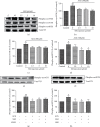The Inhibition Effects of Shenmai Injection on Acetylcholine-Induced Catecholamine Synthesis and Secretion by Modulating Nicotinic Acetylcholine Receptor Ion Channels in Cultured Bovine Adrenal Medullary Cells
- PMID: 33456492
- PMCID: PMC7787763
- DOI: 10.1155/2020/8514926
The Inhibition Effects of Shenmai Injection on Acetylcholine-Induced Catecholamine Synthesis and Secretion by Modulating Nicotinic Acetylcholine Receptor Ion Channels in Cultured Bovine Adrenal Medullary Cells
Abstract
Shenmai injection (SMI) has been widely used for the treatment of cardiovascular diseases in China. Cardiovascular disorders are often related to excessive catecholamine (CA) secretion. Here, we report the effects of SMI on CA secretion and synthesis in cultured bovine adrenal medullary cells. We found that SMI significantly reduced CA secretion induced by 300 μM acetylcholine (ACh). Cotreatment with SMI (10 μL/mL) and either of the ACh receptor α-subunit inhibitors, HEX (α3) or DhβE (α4β2), did not produce any further inhibition, indicating that SMI may play a role through α3 and α4β2 channels. Furthermore, SMI reduced tyrosine hydroxylase (TH) activity induced by ACh by inhibiting the phosphorylation of TH at Ser19 and Ser40. TH is phosphorylated at Ser19 by Ca2+/calmodulin-dependent protein kinase II (CaM kinase II) and at Ser40 by protein kinase A (PKA). KN-93 and H89, the antagonists of CaM kinase II and PKA, respectively, inhibited the ACh-induced phosphorylation at Ser19 and Ser40, and the addition of SMI did not augment the inhibitory effect. Taken together, our results show that SMI likely inhibits CA secretion by blocking TH activity at its Ser19 and Ser40 sites.
Copyright © 2020 Xiting Zhang et al.
Conflict of interest statement
The authors declare that there are no conflicts of interest.
Figures





Similar articles
-
Stimulatory effect of nobiletin, a citrus polymethoxy flavone, on catecholamine synthesis through Ser19 and Ser40 phosphorylation of tyrosine hydroxylase in cultured bovine adrenal medullary cells.Naunyn Schmiedebergs Arch Pharmacol. 2014 Jan;387(1):15-22. doi: 10.1007/s00210-013-0916-6. Epub 2013 Sep 17. Naunyn Schmiedebergs Arch Pharmacol. 2014. PMID: 24043291
-
Ikarisoside A inhibits acetylcholine-induced catecholamine secretion and synthesis by suppressing nicotinic acetylcholine receptor-ion channels in cultured bovine adrenal medullary cells.Naunyn Schmiedebergs Arch Pharmacol. 2015 Dec;388(12):1259-69. doi: 10.1007/s00210-015-1161-y. Epub 2015 Aug 11. Naunyn Schmiedebergs Arch Pharmacol. 2015. PMID: 26257152
-
Correlation of activation of Ca2+/calmodulin-dependent protein kinase II with catecholamine secretion and tyrosine hydroxylase activation in cultured bovine adrenal medullary cells.Mol Pharmacol. 1994 Dec;46(6):1041-7. Mol Pharmacol. 1994. PMID: 7808423
-
Ca(2+)/calmodulin-dependent protein kinase II inhibitor KN-62 inhibits adrenal medullary chromaffin cell functions independent of its action on the kinase.J Neurochem. 1996 Jun;66(6):2517-22. doi: 10.1046/j.1471-4159.1996.66062517.x. J Neurochem. 1996. PMID: 8632177
-
New insights into the pharmacological potential of plant flavonoids in the catecholamine system.J Pharmacol Sci. 2014;124(2):123-8. doi: 10.1254/jphs.13r17cp. Epub 2014 Jan 31. J Pharmacol Sci. 2014. PMID: 24492414 Review.
References
-
- Li X., Toyohira Y., Horisita T., et al. Ikarisoside A inhibits acetylcholine-induced catecholamine secretion and synthesis by suppressing nicotinic acetylcholine receptor-ion channels in cultured bovine adrenal medullary cells. Naunyn-Schmiedeberg’s Archives of Pharmacology. 2015;388(12):1259–1269. doi: 10.1007/s00210-015-1161-y. - DOI - PubMed
-
- Taeko M., Yumiko T., Susumu U., et al. Simvastatin inhibits catecholamine secretion and synthesis induced by acetylcholine via blocking Na+ and Ca2+ influx in bovine adrenal medullary cells. Journal of Pharmacology & Experimental Therapeutics. 2008;327(1):130–136. doi: 10.1124/jpet.108.139659. - DOI - PubMed
LinkOut - more resources
Full Text Sources
Molecular Biology Databases
Miscellaneous

